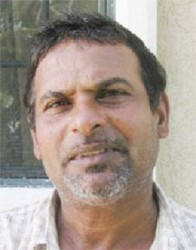The Essequibo Paddy Farmers Association (EPFA) on Wednes-day reached out to the two largest private sector bodies in the country hoping the agencies could use their influence to ensure that the rice sector conforms to transparent practices.
At a press briefing held at the Ariantze Hotel, President of the the EPFA, Naith Ram stated that the meetings with the umbrella Private Sector Commission (PSC) and the Georgetown Chamber of Commerce and Industry (GCCI) were successful. He stated that the next step was to petition the Ministry of Agriculture, requesting a sit down with the minister to discuss the future of the rice industry from the perspective of rice farmers.
President of the PSC, Ramesh Persaud told Stabroek News that the EPFA came forward to express their frustration with how the Rice Factories Act was being implemented to the detriment of rice farmers. He said that their main concerns were with how paddy prices were being set and that the PSC promised to conduct more research to establish what the current situation on the ground was. Persaud told Stabroek News that how the information, including the facts and figures, was presented by the EPFA was not done in a structured manner and as a result the Commission would need to conduct its own technical research. He said that so far the Commission could only promise to inquire of the various stakeholders including the Guyana Rice Development Board in terms of the processes currently being used.


While the EPFA was consulting with the PSC and the GCCI, their technical data was being questioned also by the Rice Producers Association (RPA). At the press briefing, the EPFA’s Chairperson Ram stated that to date over 1000 farmers are yet to be paid by millers since the first crop of 2014 and from the two in 2013. He stated that some 25 percent of farmers were yet to be paid even though the Agriculture Ministry and the RPA had promised outstanding payments would all be received by August 8th.
Stabroek News asked the EPFA representatives if the RPA and the GRDB were not releasing the correct information why the association did not keep track of the number of farmers not being paid by millers. Ram noted that since the association was not registered this proved to be difficult. Stabroek News has asked the EPFA in the past to provide the number of association members who are yet to be paid fully and how much and while some had provided their outstanding amounts many of them received payments on a regular basis.
President of the RPA, Leekha Rambrich told Stabroek News that he continues to question where the EPFA was getting their figures from. He said that the total number of farmers still to be paid was not more than 22. He noted that it was currently only one miller who was problematic and the miller has since provided post-dated cheques to the farmers in question. He said that if the miller was unable to pay he would have to deal with the consequences of issuing bad cheques.
In July, the government through the Ministry of Agri-culture assisted a popular rice miller, Nazeemul Hakh with the sum of $400 million as an advance payment in order for him to pay rice farmers. Secretary of the EPFA, Alex George, at the Wednesday press briefing stated that the sum was just “a drop in the bucket,” due to the fact that some millers owed in excess of $900 million and $700 million.
Rambrich also called out the EPFA for not looking to grow the rice sector from their end. He said that storage facilities continue to be an issue and farmers could be forming cooperatives to build small-scale drying and storage facilities. Rambrich said that for the EPFA to state that they could not export paddy regionally or internationally because they were not a registered entity was completely unacceptable. He said that in fact rice farmers were all private businesses and if they were able to find suitable export markets they could sell their excess paddy once they met all the legal requirements.
He told Stabroek News that the RPA recognized the constant issue with millers not paying farmers in a timely manner, but also noted that farmers and millers were very similar in their experience. He said that while farmers had no room to store paddy, they would sell to millers with the understanding that millers would be unable to pay for all of the paddy as paddy and rice are exported on an instalment basis.
Rambrich echoed previous remarks by the RPA’s General Secretary Dharamkumar Seeraj when he noted that since the Venezuelan agreement where rice is bartered for oil, millers and farmers became lax and heavily reliant on the better prices and have not taken charge of finding other export markets.
He said with reaping to commence in the next two weeks the amount of paddy on the ground could surpass 250,000 tonnes. Rambrich told Stabroek News that currently there is about 122,000 tonnes that is awaiting processing and shipping.
Rambrich disclosed that in Berbice farmers face similar issues but the EPFA has made the issue more political. Many Essequibo farmers however are smaller scale rice famers with the average plot size being around 10 acres. Due to the smaller scale of farming on the Essequibo Coast, farmers would need their payments to be more prompt as they conduct their business on a cash basis.
Taje Shewcharan, the EPFA’s Vice-Chairman expressed his frustration at the press briefing noting that the ministry is projecting over 600,000 tonnes of production this year compared to the 535,555 tonnes in 2013 and yet large-scale export markets are still to be formalized. He stated that farmers are told to grow and to produce, yet they are also absorbing massive amounts of debt because payments are not occurring in a timely fashion.
He noted that many farmers are contemplating whether to plant as much as they can because the expected return has not been the case for years. He said that as it stands, rice farmers are responsible for 85 percent of the industry yet have such a small voice when the future of the sector is discussed at the ministry level.
Just prior to the harvest commencing, farmers are preparing for even lower paddy prices. Stabroek News was told by one rice farmer that while millers have stated that they will be paying $2500 per bag of paddy, farmers’ cost of production is estimated at $2300 per bag leaving a measly $200 profit.
This newspaper was told that per acre, farmers can expect anywhere from 25-30 bags, however with many farmers growing on a smaller scale and having 10-acre plots the profits are minimal and as a result many want government intervention to ensure that high prices are maintained and new markets solidified.
Guyana is expected to increase its rice exports by 50,000 tonnes this year, last year it was just under 400,000 tonnes. The new markets however are small-scale with 2,000 tonnes going to Belize and 3,000 tonnes going to Belgium. Guyana has increased exports to Jamaica because the Caribbean nation has stopped importing from the American market due to prices.




